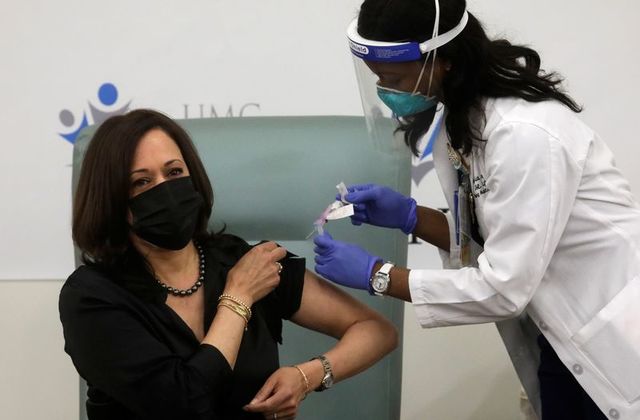WASHINGTON, (Reuters) – U.S. Vice President-elect Kamala Harris received a COVID-19 vaccination live on television today, as the incoming Biden administration seeks to boost confidence in the inoculation even while warning it will be months before it is available to all.
Senator Harris, who is Black and Asian-American, will become the second high-profile person from an ethnic minority background to receive the vaccine after Surgeon General Jerome Adams on Dec. 18.
Democratic President-elect Joe Biden, who takes office on Jan. 20, has said he will make the fight against the coronavirus, which has infected more than 19 million Americans and killed over 334,000, his top priority. He received his first injected dose of the vaccine live on television last week. Two doses are required for full protection.
The Biden team has put particular emphasis on the importance of encouraging vaccine distribution and inoculation in non-white groups especially hard hit by the coronavirus.
Harris received the Moderna Inc COVID-19 vaccine from a nurse wearing a mask and a face visor at a medical center in predominately black southeast Washington.
“I barely felt it,” Harris said, laughing, after receiving the injection in her upper left arm.
“I want to encourage everyone to get the vaccine – it is relatively painless … it is safe … it’s literally about saving lives. I trust the scientists.”
Biden is scheduled to give an update on the pandemic in Wilmington, Delaware, later on Tuesday after a briefing with his COVID-19 advisory team and warn that infection rates and the number of deaths are expected to increase in coming weeks, an official from his transition team said.
“He will be truthful and straightforward with the American people about what lies ahead, and will address the current administration falling short on its pace for vaccinations. He will also lay out his plan to get people vaccinated as quickly as possible,” the official said, speaking on condition of anonymity.
Outgoing Republican President Donald Trump, who had COVID-19 in October, frequently has played down the severity of the pandemic and overseen a response many health experts say was disorganized, cavalier and sometimes ignored the science behind disease transmission.
Biden will inherit the logistical challenges of distributing the vaccine to hundreds of millions of Americans, as well as the task of persuading people who worry its development was rushed to take it.
Biden and his team have warned the vaccine will take time to roll out to the general population and urged people to listen to the advice of medical experts to avoid infection by the coronavirus.
Dr. Atul Gawande, a member of Biden’s COVID-19 advisory board, told CBS News the transition team still did not have all the information it needed to understand the bottlenecks hampering vaccine distribution.
He warned that the Trump administration may have set unrealistic expectations that everyone who wanted to get vaccinated could do so by the end of June 2021.
“The realistic picture is to expect it could be fall before … enough people are being vaccinated that we’re getting back to normal and that it might be summer before the general public is really accessing the vaccine,” he said.
Other Biden transition officials have echoed such caution.
Dr. Vivek Murthy, Biden’s pick for surgeon general, told NBC News last week that while it was possible that people in lower-risk categories would get the vaccine in the late spring, it was more realistic to expect it would be midsummer or early fall before it reached the general population.
The United States has so far authorized two COVID-19 vaccines: one developed by Pfizer Inc and German partner BioNTech SE and the other by Moderna. Others are being evaluated.
Separately on Tuesday, the Republican-controlled U.S. Senate is expected to address whether to increase coronavirus aid checks for Americans to $2,000, a measure approved by the Democratic-led House of Representatives on Monday after Trump called for the increase. Biden has said he favors the increase from an already approved $600.

